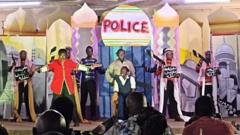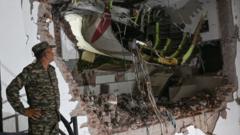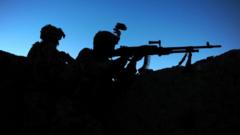The Kenyan national high-school drama competition faced an unexpected upheaval as police deployed tear gas to disperse crowds, igniting debate about restrictions on artistic expression. The controversial play, Echoes of War, shines a light on youth disillusionment, prompting protests and calls for the protection of the arts from political interference.
Tear Gas Disrupts Drama Competition as Kenyan Youth Stand Up for Their Art

Tear Gas Disrupts Drama Competition as Kenyan Youth Stand Up for Their Art
A police clash with students at Kenya's national high-school drama competition highlights growing tensions surrounding free expression and youth activism.
In a startling turn of events, Kenya’s national high-school drama competition was marred by conflict when police fired tear gas to disperse crowds gathered in support of a provocative play, illustrating the tensions between youth activism and state authority. The production, titled Echoes of War, presents a fictional narrative where disenchanted youth confront corrupt leadership through battles with law enforcement. This play's connection to recent protests against tax hikes spurred interest, leading to its reinstatement in the festival after a court ruling overturned its disqualification.
The situation escalated in Nakuru on Thursday, as students of Butere Girls School protested after their scriptwriter, Cleophas Malala, a former senator, was detained by police hours before their final rehearsal. Though Malala was later released without charges, he commended the students for their bold actions, framing their walkout as a significant act of rebellion. "The young girls of Butere easily proved that heroism is alive and well—echoing the spirit of our times," Malala stated, asserting his determination to showcase the play to Kenyan audiences.
In a defiant show of unity, students sang the national anthem before exiting the venue, expressing frustration against police hostility when they stated, "There's no audience. Who are we performing for?" The students’ protest drew large crowds, but anti-riot police, equipped with tear gas canisters, were positioned to prevent potential unrest.
Opposition to Malala's involvement in the competition came from Education Minister Julius Ogamba, who questioned the appropriateness of a politician as a scriptwriter amidst school performances. Interior Minister Kipchumba Murkomen echoed these sentiments, calling for a distinct separation of politics and education, warning against using students as pawns in political disputes.
Human rights organizations, such as Amnesty International, criticized the state’s actions, framing them as a concerning indicator of repression against free expression and assembly. Chief Justice Martha Koome condemned Malala’s detention, highlighting it as a violation of court orders that ensure participation in the competition. Prominent opposition leader Kalonzo Musyoka denounced the police response, commending the courage of the students in refusing to perform under oppressive circumstances.
As the drama surrounding the competition unfolds, it raises crucial questions about the intersection of art, politics, and youth engagement in Kenya, positioning the Echoes of War as more than just a theatrical performance—it becomes a symbol of resistance for a generation unwilling to be silenced.





















